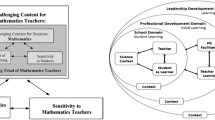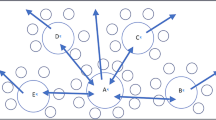Abstract
Facilitators of professional development (PD) for mathematics teachers currently gain increasing attention, as their practices are crucial for the success of spreading mathematics educational ideas and innovations into schools and strengthening the professional expertise of teachers. So far, mainly two components of facilitation have been empirically researched: facilitators’ knowledge resources and facilitation moves. In this paper, we propose to develop a more comprehensive conceptual framework in order to explain facilitators’ practices and underlying decisions. For this purpose, we lift Schoenfeld’s ROG framework for teachers' decision-making (comprising resources, orientations, and goals) to the facilitator level, and add identity as a fourth component to obtain what we call the ROGI framework. We draw on data collected simultaneously in two PD projects for mathematics teachers in Germany and in Israel. Through three cases of facilitation, we illustrate how the adapted ROGI framework helps to understand processes of decision-making made by facilitators during mathematics professional development sessions.







Similar content being viewed by others
References
Arcavi, A., & Karsenty, R. (2018). Enhancing mathematics teachers’ reflection and knowledge through peer-discussions of videotaped lessons: A pioneer program in Israel. In N. Movshovitz-Hadar (Ed.), K-12 mathematics education in Israel - issues and challenges (pp. 303–310). World Scientific.
Beswick, K., & Chapman, O. (Eds.). (2020). International handbook of mathematics teacher education, Volume 4: The mathematics teacher educator as a developing professional (2nd Ed.). Leiden: Brill-Sense.
Borko, H., Carlson, J., Deutscher, R., Boles, K. L., Delaney, V., Fong, A., Jarry-Shore, M., Malamut, J., Million, S., Mozenter, S., & Villa, A. M. (2021). Learning to lead: An approach to mathematics teacher leader development. International Journal of Science and Mathematics Education. https://doi.org/10.1007/s10763-021-10157-2
Borko, H., Carlson, J., Mangram, C., Anderson, R., Fong, A., Million, S., Mozenter, S., & Villa, A. M. (2017). The role of video-based discussion in a model for preparing professional development leaders. The International Journal of STEM Education. https://doi.org/10.1186/s40594-017-0090-3
Borko, H., Jacobs, J., Koellner, K., & Swackhamer, L. (2015). Mathematics professional development: Improving teaching using the Problem-Solving Cycle and Leadership Preparation models. Teachers College Press.
Borko, H., Koellner, K., & Jacobs, J. (2014). Examining novice teacher leaders’ facilitation of professional development. Journal of Mathematical Behavior, 33, 149–167.
Carroll, C., & Mumme, J. (2007). Learning to lead mathematics professional development. Thousand Oaks.
Cobb, P., & Jackson, K. (2011). Towards an empirically grounded theory of action for improving the quality of mathematics teaching at scale. Mathematics Teacher Education and Development, 13(1), 6–33.
Coles, A. (2019). Facilitating the use of video with teachers of mathematics: Learning from staying with the detail. International Journal of STEM Education, 6(1), 1–12. https://doi.org/10.1186/s40594-018-0155-y
Elliott, R., Kazemi, E., Lesseig, K., Mumme, J., Carroll, C., & Kelley-Petersen, M. (2009). Conceptualizing the work of leading mathematical tasks in professional development. Journal of Teacher Education, 60(4), 364–379.
Even, R. (2005). Integrating knowledge and practice at MANOR in the development of providers of professional development for teachers. Journal of Mathematics Teacher Education, 8(4), 343–357.
Even, R., & Krainer, K. (2014). Education of mathematics teacher educators. In S. Lerman (Ed.), Encyclopedia of mathematics education (pp. 202–204). Springer.
Foyn, T., Solomon, Y., & Braathe, H. J. (2018). Clever girls’ stories: The girl they call a nerd. Educational Studies in Mathematics, 98(1), 77–93. https://doi.org/10.1007/s10649-017-9801-4
Gee, J. (2000). Identity as an analytic lens for research in education. Review of Research in Education, 25(1), 99–125.
Gibbons, L. K., Lewis, R. M., Nieman, H., & Resnick, A. F. (2021). Conceptualizing the work of facilitating practice-embedded teacher learning. Teaching and Teacher Education, 101, 1–12. https://doi.org/10.1016/j.tate.2021.103304
Graven, M., & Heyd-Metzuyanim, E. (2019). Mathematics identity research: the state of the art and future directions. ZDM Mathematics Education, 51, 361–377. https://doi.org/10.1007/s11858-019-01050-y
Gresalfi, M., & Cobb, P. (2011). Negotiating identities for mathematics teaching in the context of professional development. Journal for Research in Mathematics Education, 42(3), 270–304.
Hodges, T. E., & Cady, J. A. (2012). Negotiating contexts to construct an identity as a mathematics teacher. Journal of Educational Research, 105(2), 112–122.
Holland, D., Lachicotte, W., Skinner, D., & Cain, C. (1998). Identity and agency in cultural worlds. Harvard University Press.
Jaworski, B., & Huang, R. (2014). Teachers and didacticians: Key stakeholders in the processes of developing mathematics teaching. ZDM, 46(2), 173–188.
Karsenty, R. (2016). Preparing facilitators to conduct video-based professional development for mathematics teachers: Needs, experiences and challenges. Paper presented at the 2nd International Conference on Educating the Educators, Freiburg, Germany, November 2016.
Karsenty, R. (2018a). Talking about observed practices: Enhancing novice facilitators’ proficiency to steer video-based discussions with mathematics teachers. Paper presented at EARLI SIG-11 Conference (Teaching and Teacher Education), University of Agder, Kristiansand, Norway, June 2018.
Karsenty, R. (2018b). Professional development of mathematics teachers: Through the lens of the camera. In G. Kaiser, H. Forgasz, M. Graven, A. Kuzniak, E. Simmt, & B. Xu (Eds.), Invited lectures from the 13th International Congress on Mathematical Education (pp. 269–288). Springer.
Karsenty, R. (2020). The role of frameworks in researching knowledge and practices of mathematics teachers and teacher educators. In: S. Zehetmeier, D. Potari, & M. Ribeiro (Eds.), Professional development and knowledge of mathematics teachers (ERME Book Series: New perspectives on research in mathematics education, pp. 62–84). Routledge: Taylor & Francis.
Karsenty, R., & Arcavi, A. (2017). Mathematics, lenses and videotapes: A framework and a language for developing reflective practices of teaching. Journal of Mathematics Teacher Education, 20(5), 433–455.
Kuzle, A., & Biehler, R. (2015). Examining mathematics mentor teachers’ practices in professional development courses on teaching data analysis: Implications for mentor teachers’ programs. ZDM: Mathematics Education, 47(1), 39–51.
Lesseig, K., Elliott, R., Kazemi, E., Kelley-Petersen, M., Campbell, M., Mumme, J., & Carroll, C. (2017). Leader noticing of facilitation in videocases of mathematics professional development. Journal of Mathematics Teacher Education, 20(6), 591–619.
Losano, L., Fiorentini, D., & Villarreal, M. E. (2017). The development of a mathematics teacher’s professional identity during her first year teaching. Journal of Mathematics Teacher Education. https://doi.org/10.1007/s10857-017-9364-4
Prediger, S., & Pöhler, B. (2019). Conducting PD discussions on language repertoires: a case study on facilitators’ practices. In M. Graven, H. Venkat, A. Essien, & P. Vale (Eds.), Proceedings of 43rd annual meeting of the International Group for the Psychology of Mathematics Education (PME 43) (Vol. 3, pp. 241–248). Pretoria: PME.
Prediger, S. (2018). Comparing and combining research approaches to empirically inform the design of subject-matter interventions: The case of fostering language learners’ strategies for word problems. RISTAL Journal for Research in Subject-Matter Teaching and Learning, 1(1), 4–18.
Prediger, S. (2019). Promoting and investigating teachers’ pathways towards expertise for language-responsive mathematics teaching. Mathematics Education Research Journal, 31(4), 367–392. https://doi.org/10.1007/s13394-019-00258-1
Prediger, S., Rösken-Winter, B., & Leuders, T. (2019). Which research can support PD facilitators? Research strategies in the Three-Tetrahedron Model for content-related PD research. Journal for Mathematics Teacher Education, 22(4), 407–425. https://doi.org/10.1007/s10857-019-09434-3
Prediger, S., & Zindel, C. (2017). School academic language demands for understanding functional relationships: A design research project on the role of language in reading and learning. Eurasia Journal of Mathematics, Science and Technology Education, 13(7b), 4157–4188.
Rösken-Winter, B., Schüler, S., Stahnke, R., & Blömeke, S. (2015). Effective CPD on a large scale: Examining the development of multipliers. ZDM Mathematics Education, 47(1), 13–25. https://doi.org/10.1007/s11858-014-0644-5
Schoenfeld, A. H. (2010). How we think: A theory of goal-oriented decision making and its educational applications. New York: Routledge.
Schwarts, G. (2020). Facilitating a collaborative professional development for the first time. In: H. Borko & D. Potari (Eds.), Teachers of mathematics working and learning in collaborative groups, Proceedings of the 25th ICMI Study Conference (pp. 540–547). ICMI.
Schwarts, G., Pöhler, B., Elbaum-Cohen, E., Karsenty, R., Arcavi, A., & Prediger, S. (2021). Novice facilitators’ changes in practices: From launching to managing discussions about mathematics teaching. Journal of Mathematical Behavior, 64. https://doi.org/10.1016/j.jmathb.2021.100901.
Shulman, L. S. (1986). Those who understand: Knowledge growth in teaching. Educational Researcher, 15(2), 4–14.
Speer, N. M. (2005). Issues of methods and theory in the study of mathematics teachers’ professed and attributed beliefs. Educational Studies in Mathematics, 58(3), 361–391.
Sztajn, P., Borko, H., & Smith, T. (2017). Research on mathematics professional development. In J. Cai (Ed.), Compendium for research in mathematics education (pp. 793–823). NCTM.
van Es, E., Tunney, J., Goldsmith, L. T., & Seago, N. (2014). A framework for the facilitation of teachers’ analysis of video. Journal of Teacher Education, 65(4), 340–356.
Wood, M. B., & Turner, E. E. (2015). Bringing the teacher into teacher preparation: Learning from mentor teachers in joint methods activities. Journal of Mathematics Teacher Education, 18(1), 27–51.
Zaslavsky, O., & Leikin, R. (2004). Professional development of mathematics teacher educators: Growth through practice. Journal of Mathematics Teacher Education, 7(1), 5–32.
Zehetmeier, S. (2015). Sustaining and scaling up the impact of professional development programs. ZDM, 47(1), 117–128.
Acknowledgements
The research was supported by the German-Israeli Foundation for Scientific Research and Development, Grant No. 1426. The German part has grown within the research context of the DZLM (German Center for Mathematics Teacher Education).
Author information
Authors and Affiliations
Corresponding author
Additional information
Publisher's Note
Springer Nature remains neutral with regard to jurisdictional claims in published maps and institutional affiliations.
Rights and permissions
About this article
Cite this article
Karsenty, R., Pöhler, B., Schwarts, G. et al. Processes of decision-making by mathematics PD facilitators: the role of resources, orientations, goals, and identities. J Math Teacher Educ 26, 27–51 (2023). https://doi.org/10.1007/s10857-021-09518-z
Accepted:
Published:
Issue Date:
DOI: https://doi.org/10.1007/s10857-021-09518-z




